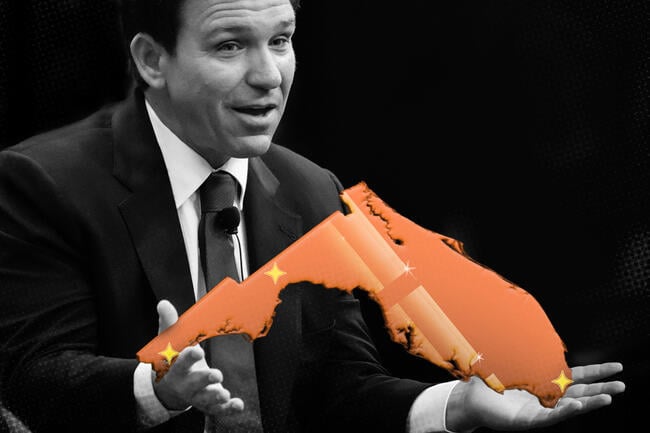You have /5 articles left.
Sign up for a free account or log in.

With three new hires, half the presidents of Florida’s public colleges and universities have connections to Governor DeSantis or Republican politics.
Photo illustration by Justin Morrison/Inside Higher Ed | Drew Angerer/Getty Images
Roughly two weeks after the Florida Board of Governors rejected Santa Ono as the next president of the University of Florida over his past support of diversity, equity and inclusion initiatives, members signed off on the hire of three new college leaders, all from the political world.
None of the three has led a university before.
On Wednesday FLBOG confirmed Jeanette Nuñez as president of Florida International University, Marva Johnson to head up Florida A&M University, and Manny Diaz Jr. to lead the University of West Florida. Both Nuñez and Diaz are former Republican lawmakers; Nuñez stepped down from her role as lieutenant governor in February to take the FIU job in an interim capacity at first. Diaz, who was confirmed Wednesday as interim and is expected to end up in the position permanently, will leave his job as Florida commissioner of education. Johnson is a lobbyist whom Republican Governor Ron DeSantis previously appointed to various positions, including on the Florida State Board of Education.
While Ono—a three-time college president unanimously selected by the UF Board of Trustees—was rejected by the Florida Board of Governors on a 10-to-6 vote, Nuñez, Johnson and Diaz were swiftly confirmed at Wednesday’s meeting, with little discussion of their qualifications.
Diaz, who served as the chief operating officer of Florida’s private Doral College from 2013 to 2022, is the only one of the three who has worked in higher education leadership.
The placement of the three new politically connected presidents means that half the presidents of Florida’s 12 public universities now have political connection to DeSantis or the GOP—some as former lawmakers or gubernatorial appointees, others as Republican donors. That trend is also apparent among leaders of the 28-member Florida College System.
A Stark Contrast
Concerns about political interference in the state’s executive hiring processes were on clear display during the testy public comment portion of Wednesday’s Board of Governors meeting. Of the 15 speakers allowed to offer remarks, most called on the board to reject Johnson.
“As students, as primary stakeholders in this university, we are very concerned about the future of our university,” Devin Nobles Jr., a Florida A&M student, told the Board of Governors during last week’s meeting. “The candidate does not meet the qualifications as set before us by our own presidential search committee. Our entire process has been riddled with impropriety.”
Multiple others also questioned Johnson’s qualifications, as well as her alignment with Florida A&M’s mission and values; several speakers accused her of stumbling through on-campus interviews and failing to articulate a clear vision for how she would lead the university.
Only Diaz faced any sort of scrutiny from the Florida Board of Governors. Those concerns were connected not to his qualifications but to his contract, which stipulates a base salary of $643,000 in addition to a $60,000 monthly housing allowance, among other perks.
Eric Silagy, the only Florida Board of Governors member to vote against hiring Diaz, questioned the salary, as well as how the interim president would be held accountable without a performance bonus that would be awarded only if UWF hit certain metrics. Silagy also pressed UWF board chair Rebecca Matthews on tapping Diaz as interim immediately after the resignation of current president Martha Saunders, who announced plans to step down after a wave of conservative trustees was appointed to UWF’s board. One of those trustees has scrutinized past actions at the university, including social media posts about DEI efforts.
And given Diaz’s intentions to pursue the permanent job after quickly being tapped as interim, Silagy expressed concerns about what’s next for UWF.
“I think we’re going to end up with a failed search,” Silagy warned.
While Ono fielded questions for three hours before he was denied the top job at UF, last week’s hires were confirmed in minutes. Some critics see hypocrisy in that disparity.
Amanda Phalin, a UF professor and former member of the Florida Board of Governors until her term ended on May 31, has been critical of the vote to reject Ono. She called that decision an “embarrassment” and a demonstration of “complete and utter hypocrisy” by board members.
“They advocate for viewpoint diversity, as long as it conforms with the ideology of their viewpoint,” Phalin told Inside Higher Ed.
She argued that Ono’s interview process was more of an “interrogation” that focused almost entirely on politics and was largely devoid of questions about how he would run the university.
While Phalin said she was not “opposed to having politicians run universities” and had voted to confirm lawmakers, she suggested the contrast between how Ono was treated compared to the three candidates confirmed last week marked an inflection point in “the politicization of the state university system.”
Politically Connected Hires
Multiple former lawmakers and others with GOP ties have been hired as presidents in Florida in recent years. The pace of those hires appears to be accelerating since DeSantis began his second term in 2023, and particularly in the current year. DeSantis, who is expected to exit the office in 2027 due to term limits, did not respond to a request for comment from Inside Higher Ed about recent hires.
One search firm insider, speaking on the condition of anonymity, told Inside Higher Ed there was “no doubt” that politics are increasingly a deciding factor in who gets presidential jobs in Florida.
The search firm insider suggested recent hires have been driven by “a governor who wants to be able to get his people” into plum presidential jobs to “pay them back for things they’ve done.”
“It looks like political favoritism and a spoils system,” they said of recent presidential hires.
Recent executive hires in Florida with ties to DeSantis or the Republican party include:
2022
- Ray Rodrigues, former state legislator, now chancellor of the State University System of Florida
- Ben Sasse, former Republican U.S. senator from Nebraska, named president of University of Florida (resigned abruptly last July shortly before a spending scandal emerged)
2023
- Richard Corcoran, former lawmaker and commissioner of education, now president of New College of Florida
- Fred Hawkins, former state legislator, now president of South Florida State College
2024
- Tommy Gregory, former lawmaker, now president of State College of Florida, Manatee-Sarasota
- Mel Ponder, former legislator, now leads Northwest Florida State College
2025
- Torey Alston, former local school board member appointed by DeSantis, now president of Broward College
- Manny Diaz Jr., former lawmaker and commissioner of education, now interim president of University of West Florida
- Eric Hall, former DeSantis appointee to the Florida Department of Juvenile Justice and former senior chancellor of the Florida Department of Education, now president of Pasco-Hernando State College
- Adam Hasner, former state lawmaker, now leads Florida Atlantic University
- Marva Johnson, former lobbyist and DeSantis appointee to the State Board of Education, now president of Florida A&M University
- Jeanette Nuñez, former state legislator and lieutenant governor, now president of Florida International University
Some politically connected hires have been shot down by local boards, including former state lawmaker Randy Fine (now a U.S. congressman) at FAU and Henry Mack, former senior chancellor at the Florida Department of Education, at Florida Gulf Coast University. Hall was also voted down by the board at Pasco-Hernando State College in a 2023 leadership search only to emerge as interim when President Jesse Pisors resigned in May.
Donor Connections
Others don’t have clear, direct political ties but have contributed to Republican candidates and causes, including throwing financial support behind DeSantis, campaign finance records show.
Rhea Law, president of the University of South Florida and a longtime attorney in Tampa, has donated tens of thousands of dollars to Republican candidates in the past. She has also made minor contributions to Democrats. Law, who announced plans to retire earlier this year, does not appear to have made any political donations since she was tapped as interim president in 2021.
Beyond those with clear political ties listed above, at least 15 presidents at Florida’s 40 public institutions have made political contributions ranging from a few hundred dollars to more than $10,000. Those donations largely flow to the GOP, though some also donated to the Democratic Party. Only one contributed more to Democrats than to the GOP.




